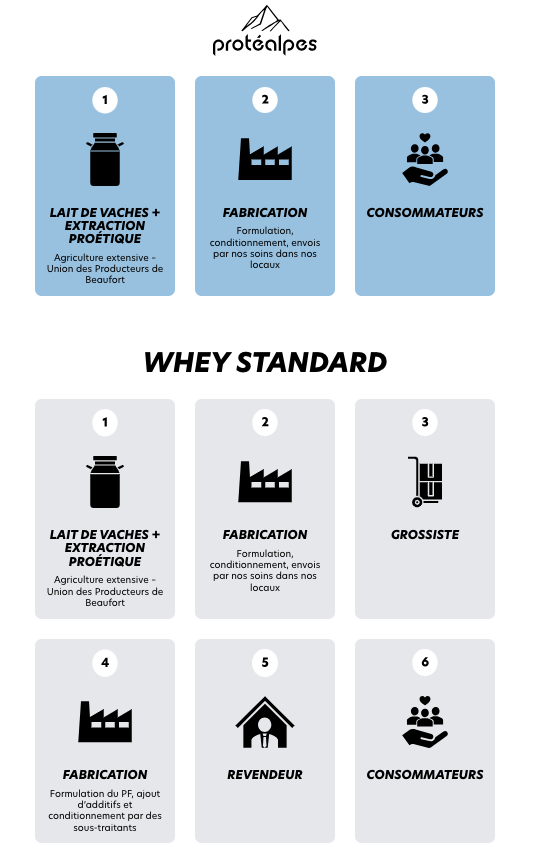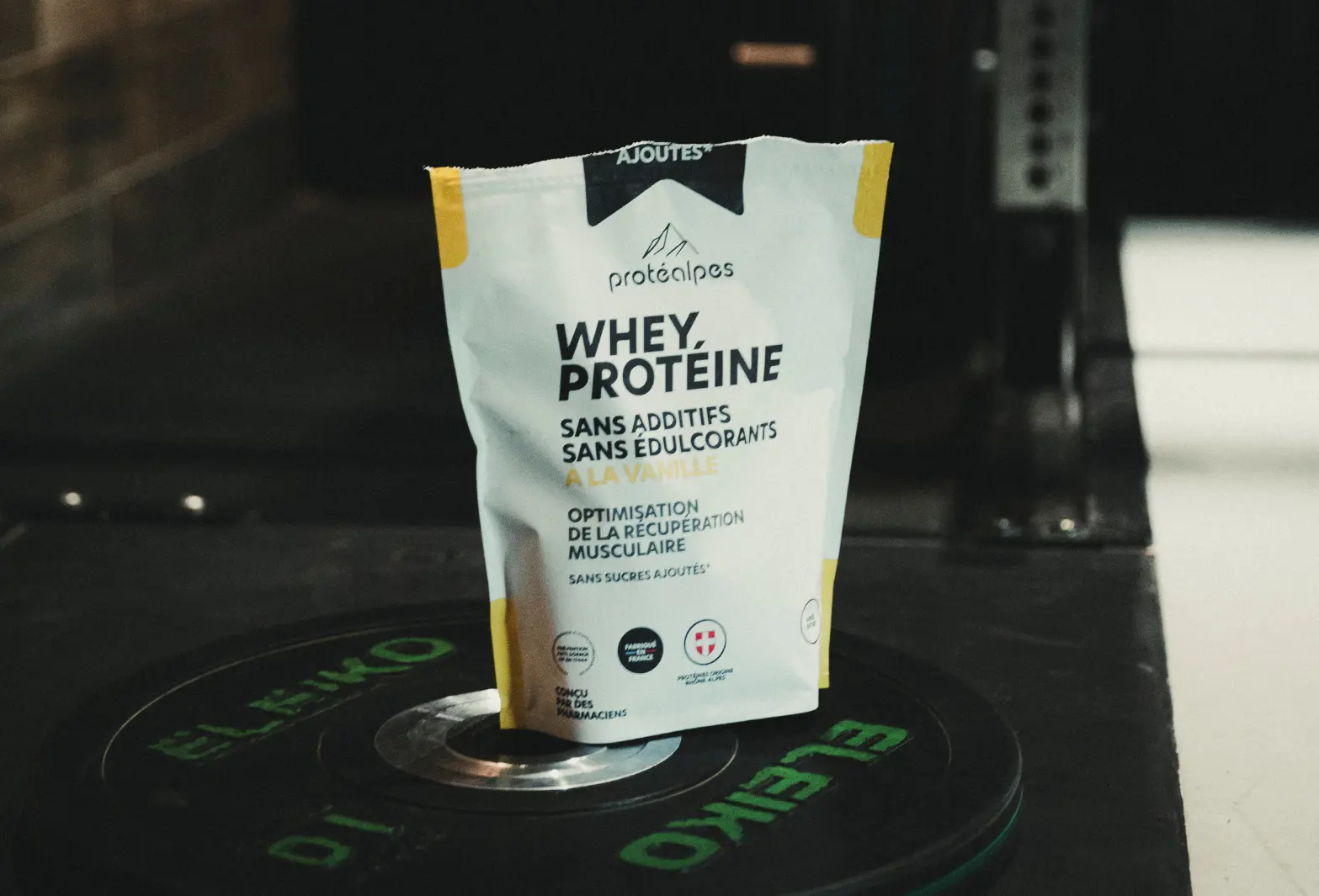One of the most common questions asked by bodybuilding enthusiasts is whether you should take protein to build muscle. No, you shouldn't, but it's a good way to supplement your sports nutrition to suit your training.
Once you've optimized your basic diet, adding Whey or other types of protein intake on a daily basis can have an interesting effect on muscle mass gain, or on the body during a dry period for fat loss. It all depends on your sporting objective , but when it comes to protein consumption, the most important thing is to keep an eye on the composition of your protein, so as to obtain a high-quality product.
Is it really necessary to eat protein when building muscle?
Many bodybuilders, as well as endurance athletes, eat protein snacks after training, so let's take a look at the reasons for consuming this nutrient.
What are proteins?
Together with carbohydrates and lipids, proteins form the so-called macronutrients that make up the majority of our diet. A protein is a chain of amino acids, assembled like bricks to form our muscular tissues.
Amino acids are therefore essential for protein synthesis. The quantity needed to make proteins varies with age, body size, muscle mass and level of physical activity.
The body produces them itself, except for 9 which must come from food and are called essential amino acids.
What role do proteins play in nutrition?
The role of proteins is very complex:
- For example, they are used for transport, like hemoglobin, which carries oxygen around the body.
- they can also be hormones, such as insulin
- they play a structural role, forming and renewing muscle cells.
In fact, 40% of protein is stored in the muscles, so there's a clear link between the two. Proteins have an anabolic (indirect) effect, i.e. they repair muscle tissue after effort, while contributing to cell development and therefore muscle growth. But beware: without basic effort, there's no anabolic effect. Protein merely optimizes the beneficial effects of training.
For athletes whose glycogen and fatty acid reserves are depleted by intense exercise, the risk is muscle wasting. This is because the body uses proteins to produce energy, and therefore attacks muscle reserves when necessary. That's why it's essential toincrease proteinintake in weight training and other intense sports.
What are the two types of protein?
Broadly speaking, there are two types of dietary protein: those ofanimal origin and those ofplant origin.
The recommended daily allowance of protein, or RDA, should be between 1.6 and 2.2 grams per kilogram of body weight per day. This recommendation applies to athletes who are building muscle mass, or who are drying out to maintain lean muscle. In practice, this gives a daily protein requirement of 120 to 165 grams for an athletic person weighing 75 kg.
There's no difference between men and women when it comes to RDAs, but the actual amount to be ingested changes with body weight.
It's worth remembering that, yes, it's a good idea to take protein when building muscle, as it enables efficient muscle contraction by being a direct component of muscle fibers. The key is toreach the RDA to avoid muscle wasting, which would impair the benefits of training.
Can you build muscle without protein powder?
Two ways to eat protein
A nutritional protein intake is necessary, but not necessarily in the form of protein powder. You can consume :
- throughfood;
- or via protein supplements, which come in various forms (Whey, casein, vegetable proteins, etc.).
A protein-rich diet is therefore sufficient for muscle growth and mass maintenance, but it all depends on the level of practice, intensity and sporting objectives .
Both formats cover protein requirements and promote muscle growth.
Quality first and foremost
If you opt for the diet alone, the protein sources are :
- animal products, such as chicken meat, fish, dairy products (yoghurt, milk) and eggs;
- vegetables, such as cereals, pulses, oilseeds and tofu.
Above and beyond the type of protein, it's the quality of the intake that counts . The protein content of a food is a key indicator. For example, 100g of chicken contains 22g of protein, while fish contains 20g for a similar quantity. The advantage of protein powders, such as Whey, is their high protein content.
In terms of quality, we also pay close attention to the overall quality of the food: extensive production, organic, origin of raw materials, means of transport...
For plant proteins, we prefer cereal + legume combinations to obtain all the essential amino acids naturally present in animal proteins.
The choice between protein powder and food protein
Natural foods are healthier in terms of dietary balance, because they contain vitamins, minerals and trace elements not found in powders. They are also less risky than powders, which are sometimes of poor quality, with additives, colorants and so on. However, powders are more rapidly assimilated, practical and effective. They enable sportsmen and women to precisely dose their protein quantities and adjust their program accordingly.
Here is a table summarizing the advantages and disadvantages of the two formats:
| PROTEIN POWDER | Classic" FOOD PROTEINS | ||
| Benefits | Disadvantages | Benefits | Disadvantages |
| ✓ convenient to consume ✓ high protein content ✓ limited calories ✓ fast assimilation | ✓ fewer micronutrients ✓ problem if poor quality ✓ variable cost | ✓ micronutrient content ✓ natural source ✓ cost | ✓ less practical ✓ variable protein content ✓ slower assimilation |
So, yes, a balanced diet is sufficient in some cases. The question is not whether or not to take protein, but rather what type of protein to consume according to your goal and situation.
When should you take protein supplements?
In the form of a Whey shaker or gainer, protein powder is better suited to dosing the right amount with precision. It is also better suited to high needs such as those related to :
- intense sport ;
- high-protein diets for weight gain;
- a busy schedule with special working hours;
- low-calorie diets for weight loss or muscle leaning.
The best strategy for building muscle is to combine food intake with protein powder, which complements it.
As for the ideal time to take your protein, it's best to spread out your intake rather than consume it all at one time of day. The idea is to plan protein-rich snacks to keep blood amino acid levels constant.
Health benefits and risks of proteins
Benefits for mass gain and recovery
Muscle building is achieved through :
- byincreasing proteinsynthesis, thanks to the essential amino acids provided by the diet;
- by stimulating muscle stem cells in the process of repairing muscle micro-injuries caused by repeated strain, and thanks to proteins.
They are therefore essential to muscle development during bodybuilding and to the recovery process after training. The quantity of protein to be ingested varies from one individual to another, but a balance must be found to avoid excess.
The risk to the body in case of excess
The three most common mistakes with proteins are :
- under-consumption of protein, which can lead to muscle wasting;
- over-consumption of protein, which has no nutritional value;
- poor protein quality
Excessive protein intake leads to impaired functioning of the liver, intestine and kidneys¹, characterized by :
- digestive disorders;
- high levels of ammonia in the blood;
- an increase in insulin ;
- dehydration;
- Nausea;
- fatigue ;
- headaches, etc.
The renal overload induced by this dietary imbalance also increases the risk of renal failure in people with pre-existing kidney disorders².
In short, protein does not induce renal distress in consumers, but over-consumption (much higher than 2.2 g/kg/d over long periods) is associated with health risks, particularly for the kidneys and liver.
How do I choose a high-quality protein?
Here are 3 criteria to consider when choosing a protein powder.
1. First and foremost, we're looking for a high-quality, additive- and sweetener-free product, manufactured in-house by the brand.
The presence of additives, such as sweeteners, emulsifiers or thickeners, has no nutritional value. If they are used for organoleptic characteristics (texture, taste, smell), they constitute a health risk, notably linked to the onset of type 2 diabetes (source INSERM).
2. We scrutinizedoping prevention labels , in particular compliance with European standard NF EN 17444, which sets out best practices for preventing the presence of banned substances in food supplements intended for athletes.
A study shows that over 28% of dietary supplements tested presented a risk of unintentional doping³. Some products contain doping substances such as growth hormones and anabolic steroids, making them dangerous. These anti-doping labels exist to avoid confusing Whey protein with doping, and above all to protect consumers.
The NF EN 17444 standard replaces and includes the requirements of the French AFNOR standard NF V 94-001 (July 2012) recommended by INSERM. It is based on the expertise of the French Health Safety Agency (Anses) and the French Ministry of Sports, to ensure the safety of products intended for athletes.
3. We also monitor the brand's transparency regarding its manufacturing process, to ensure that it makes its own products, or that it presents its manufacturers clearly and transparently. It's also a way of controlling raw material sourcing and traceability.
At Protéalpes, our process is detailed on our website to ensure that our products respect the quality that all sportsmen and women deserve. The manufacturing circuit is as short and transparent as possible:

In this way, we guarantee our consumers :
- high protein content;
- no additives or sweeteners ;
- A controlled level of carbohydrates, depending on the range, for as many BCAAs (leucine, isoleucine, valine);
- gluten-free, no trace of allergens other than milk proteins;
- an isolate obtained by cold ultrafiltration, without reheating before drying;
- milk proteins derived exclusively from Rhône-Alpes pasture milk ;
- a powder manufactured and packaged in Albertville by Protéalpes.
Conclusion: should you take protein or not?
When you're building muscle, you need protein for its anabolic effect, which is essential for muscle growth. The question then arises as to which protein to take, and the answer is far from unique. There's no such thing as the ideal protein.
Protein can be consumed via the classic diet or by taking dietary supplements such as Whey or casein. The latter is not compulsory, but is sometimes useful, depending on the goals of the exerciser, his or her level of training, or the time of day at which the food is taken, which sometimes defines the type of protein to be taken.
An essential component of muscle fibers, protein helps build muscle mass and aids recovery. It's therefore tempting to take large quantities of protein for maximum results. However, excess is not good for performance, and it's the quality of the nutrient that counts.
The best advice is to give priority to a varied, complete and balanced diet. Taking protein shakes or gainers after a session complements a good diet, provided you choose a quality protein. If you have any doubts, or if you need support on the subject, you may wish to consult a sports coach specializing in bodybuilding!





































